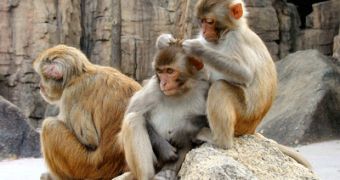The human brain has a nucleus that differentiates human speech from background sounds. A new research published in "Nature Neuroscience" shows that monkeys too have such a nucleus that reacts selectively to the voices of other monkeys. This is a step further on understanding the neural basis of voice recognition and could explain changes in the human brain connected to the evolution of speech and language.
In humans, this nucleus is located in the temporal lobe of the brain, enabling us to recognize individuals by voice, a trait also found in many animal species.
The new research, carried out by Christopher Petkov and Nikos Logothetis, both of the Max Planck Institute for Biological Cybernetics in T?bingen, Germany, found for the first time such a center in monkeys, employing functional magnetic resonance imaging to monitor the brain activity of the macaques while they were listening to various sounds.
The researchers played recorded coos, grunts, and other vocalizations made by macaques, but also other animals and natural sounds like thunder and running water. A small area of the macaques' temporal lobes turned on only in response to macaque voices, being insensitive to other sounds.
The nucleus could differentiate the voices of individual macaques: its activity decreased when the researchers played several times a monkey's voice, but it was boosted by a new played voice.
"The monkey voice region may provide clues to the evolution of speech. One possibility is that neural circuits in the brains of our distant primate ancestors, used for recognizing and evaluating the calls of other individuals, became the precursors for the neural circuits that evolved to handle more complex verbal communication such as speech," said Petkov.
"It's noteworthy, however, that the monkey and human voice regions are positioned somewhat differently in their respective temporal lobes. The voice-recognition region of our primate ancestors' brains migrated toward more recently evolved regions that decode and produce speech in the human brain--an example of the kind of neural reorganization that happened as language evolved," said neuroscientist Asif Ghazanfar of Princeton University.

 14 DAY TRIAL //
14 DAY TRIAL //